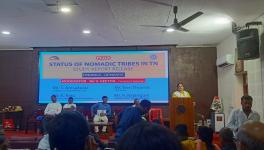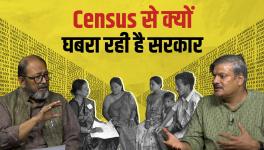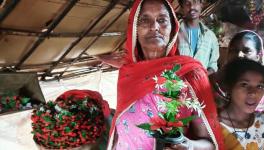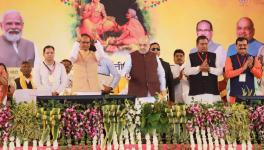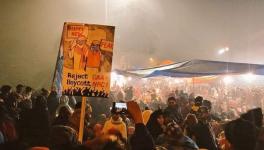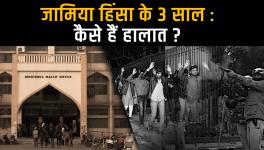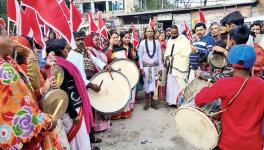In MP, 60 lakh Denotified, Nomadic, Semi-Nomadic Tribes May Lose Citizenship
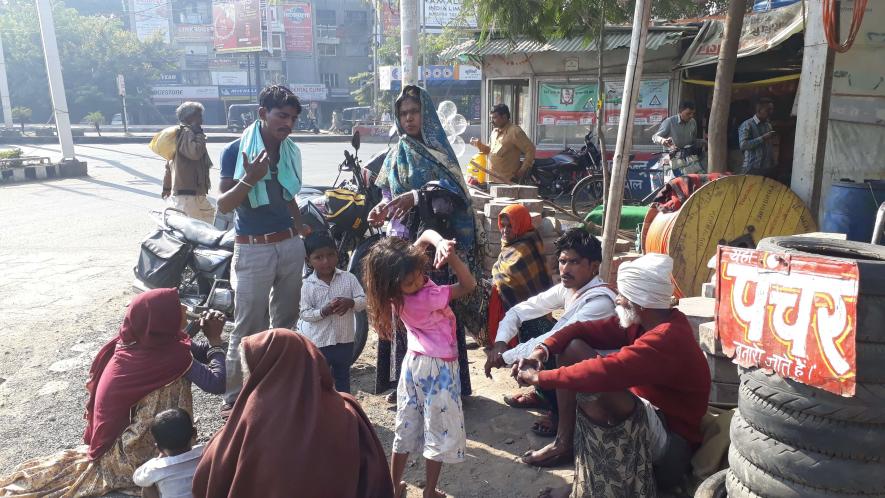
Bhopal: With the implementation of National Population Register (NPR) and National Register of Citizenship (NRC), the denotified, nomadic and semi-nomadic tribes of Madhya Pradesh, which comprise around 7-8% of the state’s population, are in fear of losing citizenship.
The Union Government on Monday approved Rs 3,941.35 crore for updating of the National Population Register (NPR), which is the first step towards the National Register of Citizenship (NRC), according to the annual report of Ministry of Home Affairs. The process of preparing the NPR will kick-start from April 2020 and will be implement across the country except Assam (where NRC has already completed).
Since the issue of Citizenship Amendment Act 2019 and NRC has created an uproar in the country, the members of these communities are facing mental agony and hardship in collecting documents.
Madhya Pradesh has 51 castes of denotified, nomadic and semi-nomadic tribes, according to the Vimukt Ghummakkar Evam Ardhgummakkar Janjati Kalyan Vibhag, which was separated from the Tribal Department in 2012. Even after seven years of its separation, the department has no official data about the total population of these communities.
But, according to a senior department official, there are over 50 lakh denotified, nomadic and semi-nomadic tribes in the state, while the Vimukt Ghummakkar Evam Ardhgummakkar Janjati Prakost of the Bharatiya Janata Party as also the Congress have pegged the population at around 60 lakh, making for 8% of the state’s total population. The state has a sizable population of 7.5 crore, according to the 2011 census.
More so, Sanjay Yadav, the head of BJP’s Vimukt Ghummakkar Evam Ardhgummakkar Janjati Prakost, who had also served as chief of Ghummakkar Jati Vikas Adhikaran Madhya Pradesh (a government body) in the BJP regime, also pegged the population around 60 lakh.
As far as the country is concerned, according to the Renka Committee 2008 report, which is based on the 2001 Census, there are more than 11 crore people across the country who belong to the denotified, nomadic and semi-nomadic tribes. The number could be higher now.
Since, the community members hardly stay in a particular place, they barely have any official proof of residence, birth, education, caste and land. They largely work as daily wage labour, shepherds, in farms, and are skilled in traditional art works.
“Except a few, most of them have no documents of birth proof or land. Neither can they get these, as they don’t even remember where they have been born. They never make birth certificates because of illiteracy,” said nomadic tribe activist, Lalit Daulat Singh.
The Shivraj Singh Chouhan government, in 2014, had launched a special drive to make caste certificates of these tribes, but, according to some officials and social activists, hardly 10-15% people succeeded in getting the certificates because of lack of official documents.
“Most of the people failed to produce any official document as per the framed rules upon which the caste certificate would be issued. Those who presented documents, received the certificate,” a senior official of the department said, requesting anonymity.
“There are 51 communities in MP and some are added in OBC (Other Backward Classes) and some are added as Scheduled Castes. So, it’s difficult to identify who is who and issue new caste certificates. This can only be done on the basis of a survey which is in pipeline,” the official added.
The Congress government, too, has launched the caste certificate drive by tweaking some norms.
Officials claimed that since Aadhaar and Jan Dhan Yojana came into existence, a few people have Aadhaar, voter ID, ration cards and bank accounts, but, according to a tweet by the Home Ministry, “Citizenship of India may be proved by giving any document relating to the date of birth or place of birth or both.”
In that situation, the communities are likely to face a tough time showing proof of date of birth and place of birth. “Those people who failed to show any documents to get caste certificate, how they can produce proof of birth or birth certificate?” said Dev Singh Chouhan, chief of Madhya Pradesh Congress Vimukt Ghummakkar Evam Ardhgummakkar Janjati Prakost.
The Prakost has also opposed the implementation of NPR and NRC and urged Chief Minister Kamal Nath to not implement these in the state.
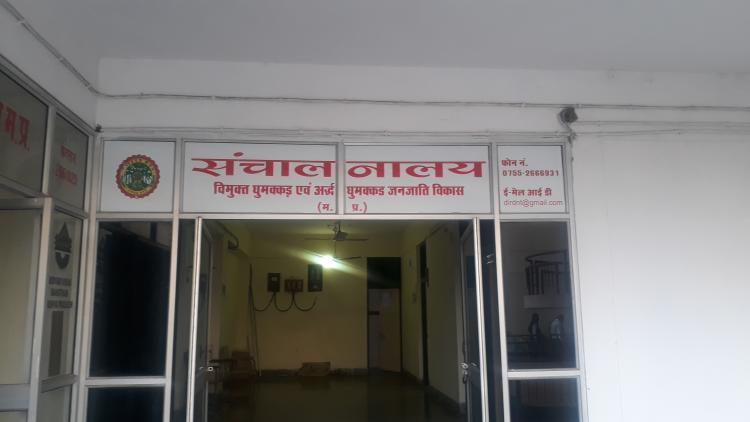
On other side, BJP’s Jadav has supported the NPR and NRC and has claimed that, “NPR and NRC should be implemented in the state, so, we can differentiate between the resident and infiltrator.”
When asked if members of his community would suffer if NRC is implemented, owing to lack of birth proof, Jadav said, “If we suffer, then we will meet with the Home Minister, the Prime Minister and the President and urge them to exempt us from it because we are Hindus and belong to the indigenous community.”
Why These Tribes Have no Documents?
To understand the reason that why these tribes have no documents, one should read about British’s arbitrary ‘Criminal Tribe Act 1871’, said nomadic tribe activist Lalit Daulat Singh.
When the gypsies and nomadic tribes of the country joined the freedom movement after the first struggle in 1857, they launched several attacks against the British. Miffed with the attacks, the British government enacted the ‘Criminal Tribes Act 1871’ as a part of their misconceived strategy to control crime in British India by branding a large number of Indian castes and communities as criminal.
This led to the creation of settlements of these tribes in various parts of the country to enable the police to exercise constant surveillance over their movement and behaviour, and thus, prevent them from committing crimes. This arrangement caused considerable harassment and hardships to these castes and communities, and adversely affected their lifestyles and sustenance. And they started running from one place to other to save themselves.
After India achieved Independence in 1947, the ‘Criminal Tribes Act 1871’ was reviewed and eventually repealed in 1952 on the recommendation of Ayyangar Committee 1949.
As a result, all the castes and communities that were notified under the Criminal Tribes Act, 1871 were denotified. Unfortunately, though the Act was repealed, its adverse impact continued on both the castes and communities which were earlier branded as criminal by the civil society at large. This anti-social legacy of the British Rule persists even today and both the police and the civil society treat them with suspicion and humiliation.
Hundreds of gypsies and members of nomadic tribes, who live near Bhopal and Habibganj railway stations, under the major flyover bridges and on road dividers of the state capital, Bhopal, alleged the city police of brutality.
“Police have been brutal with us. They ransacked our hutments, thrashed our family members and threatened us, asking us to leave the place else they would put us behind bars at night,” said Major Bagri, who is a native of Rajasthan, and lives near the board office square of the state capital and sells balloons on traffic signals with his wife and children.
Like Bagri, there are dozens who live near traffic signals, stations and face police brutality almost every day.
What Officials Say
The Principal Secretary of Vimukt Ghummakkar evam Ardhgummakkar Janjati Vikash, Ramesh Thete, could not be reached despite several attempts.
But, Deputy Director of the Department, Deepti S Kotashane, said that the department was initially planning to create a data base by conducting a survey upon which the policies would be framed. “The department have no data till date,” she added.
When asked about the repercussions of implementation of NPR and NRC on these communities, she said, “On the suggestions of PS Ramesh Thete, the department is planning to issue an ID card to every individual, which can be valid in the NRC documents. But, this is a big challenge for us.”
Kotashane further said, “Hardly 30-40% people of these communities have documents. If NRC is implemented, they could be left out, but we are concerned about it and are chalking out a plan,” adding that the Patwaris were also eligible to issue proofs of residence to the nomadic and semi-nomadic tribes living in a particular place for couple of years or decades, which could be a valid proof for NRC.
“Implementation of NPR is at an initial level, so talking about proofs of residence or birth should wait,” she added.
The Renke Committee 2008, which was constituted to look into the socio-economic condition of the denotified, nomadic and semi-nomadic tribes claimed there were 11 crore such people in the country that needs special attention, including reservation just like SC/STs. However, that report was based on the 2001 Census. Hence, the number could be higher as of now.
Get the latest reports & analysis with people's perspective on Protests, movements & deep analytical videos, discussions of the current affairs in your Telegram app. Subscribe to NewsClick's Telegram channel & get Real-Time updates on stories, as they get published on our website.










